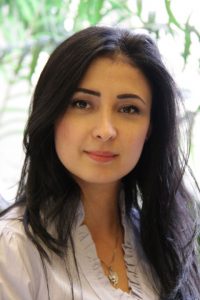
Loujein Haj Youssef has worked for Radio Rozana since the radio was launched in June 2013. Photo: Private
Syrian news editor: “The war limits the stories we can do”
For three days, Syrian Loujein Haj Youssef has been on a mission in Denmark. The 38-year old news editor in chief has followed the work of the Danish Radio 24seven to find inspiration on how to develop the management of her own workplace, Radio Rozana – a Syrian exile radio operating from Paris – and how to to professionalise their work.
“We want to get insights in other radios and see how they plan their work, how they manage their staff; we want to benefit from their experience and copy a part of it to develop and improve our work,” she explains as she shortly passes by IMS headquarters to tell about her experience.

Wearing too many hats
Eventhough Radio Rozana has almost 720.000 followers on Facebook compared to Radio 24seven’s nearly 93.000, it is a small radio. Where the Danish station has 65 employees, the Syrian exile radio has only 18 – half of them are based in the headquarters Paris and the other half in Gaziantep, a Turkish city close to the Syrian border where most of the Syrian journalists who have fled their home country now live. Both stations broadcast 24 hours a day.
Loujein Haj Youssef, who used to work with the Syrian national media, knows that the structure and size of Radio Rozana put their employers under a lot of pressure:
“24seven is very lucky; they are a large team, and because they are more people they can focus on one task instead of having to do several different tasks at the same time.”
As an example she mentions one of Rozana’s editors in Paris who is editing the foreign news while at the same time he records end edits special interviews for the internet and is in charge of making a weekly programme himself without the assistance from a producer or editor.
Soft stories in a relaxed society
During Loujein Haj Youssef’s visit with Radio 24seven, the station was working on a story concerning the plans to construct apartments on a huge nature site in greater Copenhagen which is famous for its natural diversity, and she also noticed that the station has a special programme on fishing.
This type of stories is only possible to make in a society that is “relaxed”, as Loujein Haj Youssef puts it – which is not the case with Syria:
“We are covering a country that has faced war for almost six years, so it is not easy to get the soft stories. There is a lot of pain in Syria and we have to talk about the child, who is abused by soldiers or who is working in the army – it is very tough stories. Also, our audience need information – about borders, about their health, supplies, their education, visas, passports. The news we need to bring are more vital,” she explains still wishing for the day where Radio Rozana can make fishing programmes and stories on construction of apartments on natural sites.
“We could work with having also a soft line in our work, but it cannot take up too much space,” she says.
Preparing tomorrow’s work today
Asked what she will do differently after her visit with Radio 24seven she answers promptly:
“I will remove one or two hats from my employees’ heads.” Then she laughs knowing very well that it is not possible as of now.
One thing she will try to copy back home is Radio 24seven’s strategy for publishing content.
For some time Rozana has wanted to be the first to break an information and has therefore been monitoring the news closely. But at Radio 24seven, Loujein Jah Youssef was inspired by their different approach to breaking news, where they take their time to discuss the events and make their own vision on the content, which is then published the next day:
“I liked that they prepare tomorrow’s work today. We can still continue to publish something on the same day when a news break, but rather making it a short news today and a bigger news tomorrow.”
International Media Support has supported Radio Rozana financially since the radio was launched in June 2013.




